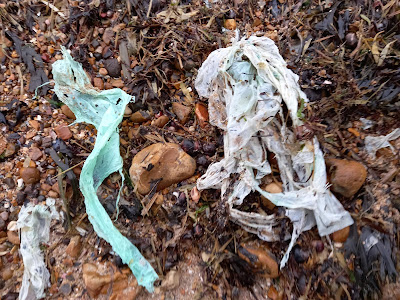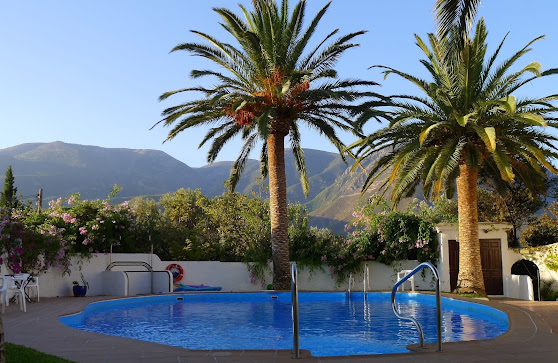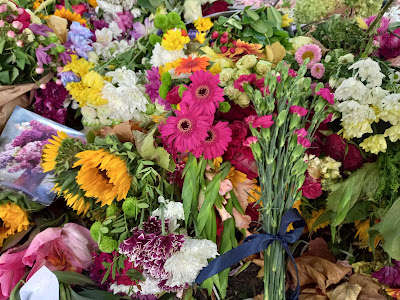Living by the sea in Whitstable has been a blessing throughout the pandemic. Being able to walk along the beach always makes me feel better and invigorated. Seeing the wide, open space of water and mudflats that change each day is a constant source of joy. I have started to recognise the patterns of bird species depending on the tide. If walking wasn't enough, becoming a winter "cold-water swimmer" has given me a deeper connection with the wildlife and the chilly sea. Each time I swim, I'm sure the same black-headed gull looks at me from his perch with slight amusement and recognition.
Last weekend, I popped out for an hour to pick up some last shreds of plastic waste that I had spotted while walking on West Beach. With wellies on, wrapped up against the bitter wind and damp air, I was shocked and dismayed to see how much plastic was on the beach. I have been part of a monthly community beach clean here for over a decade, so I intimately know about rubbish on the beach. This was different. White and some green biodegradable plastic was littered along a huge stretch of beach. It looked rather like disintegrated white plastic nappy sacks with knots and perhaps sanitary towel wrappers and a couple of condoms. But largely it was unidentifiable. I got to work.
Each day since, I've been out for an hour or two, with my bucket, litter picker, gloves and warm clothes. Rather than swim or walk, I have picked litter. Buckets and buckets of it. And strangely, this feels just as therapeutic. It could even be classed as some kind of mindfulness activity, as it is much harder to think about other things (Omicron, rising energy prices etc) while collecting and disentangling plastic. After an hour or so, I started to feel part of the natural landscape rather than just admiring it. Why would something as mundane as picking up litter be so beneficial? If it comes under the category of "
green therapy" then it works because "personal well-being and planetary well-being, are not separate from each other". Litter picking also reminds us that "people are part of the web of life and that our
psyches are not isolated or separate from our environment".
As as slowly and methodically picked up plastic, I noticed a distinct lack of sea birds around. West Beach is normally a hugely popular feeding ground for a host of migratory and local birds, my favourite being the Brent Geese at this time of year. These amazing birds migrate all the way from Siberia to this coastal area each year. As I picked up thousands of plastic pieces over the week, I only heard one Brent Goose in the far distance. Are they avoiding this area due to the plastic waste I wondered?
As I worked, I apologised to the sea and the wildlife for our human action
that has caused this. After seven hours in total of litter picking, I stepped back to admire the cleaner seascape just as an artist would admire their painting. Finally, I was seeing wet sand, strands of seaweed and the mudflats without large amounts of plastic pollution.

This morning, I strolled along West Beach in the sunshine and nearly cried, this time with joy. The birds were back. More diversity than I'd seen for weeks. About twenty Brent Geese were happily feeding in the grass near to the beach, making their familiar soothing sound. Hundreds of turnstones were even closer, almost invisible with their camouflage, pecking away at juicy grubs. Oystercatchers with their striking long red beak and red legs, were elegantly feeding too. Seagulls joined them and I felt my heart lift. Maybe it was just a coincidence, perfect weather and the tide just turning? But it was as if the birds were having a party to celebrate their feeding habitat being plastic free! Which gives me a moment of hope that our human action can help rescue our natural world, even when relentlessly under threat.
For more information about the local campaign to protect the sea from sewage pollution from Southern Water, see Facebook SOSWhitstable.
Details of monthly beach cleans in Whitstable with Marine Environment Group (Facebook)
Foreshore Services, Southern Water and the Environment Agency have all been involved.













Thankyou Sue for all your litter picking. Coming down every day for a swim can be so upsetting especially in the summer months when all the young people seem to just leave all their bottles and plastic on the beach. I think people are split into 2 species; those who care and those who don't! Every little bit of care goes a long way.
ReplyDeleteThanks for reading it and caring too about our precious environment. And for inspiring me to swim through the winter months too. See you soon on the beach when we can have a hopefully plastic free swim.
Delete"Thanks Sue, another great post."
ReplyDelete"Look sharing your pollution blog reached 178 so far ….and a lovely comment ! Well done"
ReplyDelete"Brilliant writing"
Reader: "Just to say that I loved your last blog. I am really impressed with your beach litter cleaning, as no doubt were the birds returning to it !"
ReplyDeleteThank you for your litter picking! I would have helped you... My understanding of the sea, the wildlife and the beauty of the ocean and all its changes are due to my 5 years of winter swimming. I will pick up any plastic that I see now when I'm out with the dog.
ReplyDelete